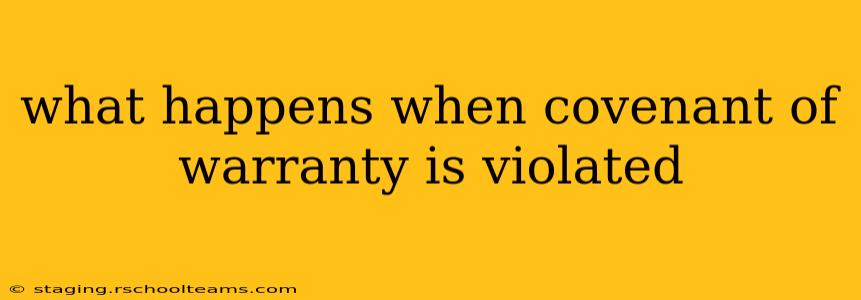A covenant of warranty is a promise in a deed or other real estate conveyance that the grantor (seller) has the right to convey the property and that the property is free from encumbrances (claims or liens) except those specifically stated. When this covenant is violated, it can lead to significant legal and financial repercussions for the grantor. Understanding the potential consequences is crucial for both buyers and sellers involved in real estate transactions.
What is a Covenant of Warranty?
Before diving into the consequences of a breach, let's clarify what a covenant of warranty entails. It's a fundamental promise made by the seller assuring the buyer of clear and marketable title. This means the seller guarantees they have the legal right to sell the property and that the title is free from undisclosed defects. This isn't just a simple assurance; it's a legally binding contract. Different jurisdictions may have slightly varying interpretations and terminology, but the core principle remains the same.
What Constitutes a Violation of the Covenant of Warranty?
A violation, or breach, occurs when the seller's promises are untrue. This can manifest in several ways:
- The seller doesn't own the property: Perhaps the seller acquired the property fraudulently or is selling property they don't have the legal right to sell.
- Undisclosed encumbrances: This is a common violation. The seller might fail to disclose existing mortgages, liens (for unpaid taxes, repairs, or judgments), easements (rights of others to use the property), or other claims that affect the buyer's full enjoyment and use of the property.
- Encroachments: Structures on the property might encroach on neighboring land, violating property lines and leading to potential disputes and legal battles.
- Title defects: Problems with the chain of title—the historical record of ownership—can constitute a breach. This could involve missing documents, forged signatures, or other irregularities that cloud the title's clarity.
What are the Consequences of a Violated Covenant of Warranty?
The consequences of a breached covenant of warranty can be severe for the seller. The buyer generally has legal recourse, which might include:
- Legal action: The buyer can sue the seller for breach of contract. This can lead to protracted and expensive legal proceedings.
- Damages: The buyer can seek monetary compensation to cover losses incurred due to the breach. This might include costs associated with resolving title defects, removing encumbrances, defending against claims, or even the difference between the purchase price and the actual value of the property with the disclosed defects.
- Specific performance: In some cases, the buyer might sue for specific performance, requiring the seller to cure the title defects and fulfill their obligations under the contract.
- Rescission of the contract: The buyer might be able to rescind (cancel) the contract entirely, returning the property to the seller and receiving a refund of the purchase price.
What if the Seller is unaware of the defect?
While most jurisdictions hold the seller accountable even if they were unaware of the defect, it's crucial to note that the seller's knowledge (or lack thereof) may impact the specific remedies available to the buyer. If the seller acted in good faith and had no reason to know about the defect, the buyer's damages might be limited. However, the burden of proof often lies with the seller to demonstrate their lack of knowledge.
How can you protect yourself?
Both buyers and sellers can mitigate risks:
- Buyers: Conduct a thorough title search, engage a real estate attorney to review the contract and the title report, and carefully inspect the property.
- Sellers: Ensure that they have clear title to the property, disclose all known encumbrances, and seek legal counsel before entering into a contract.
In summary, a violated covenant of warranty can have serious implications. Understanding the nature of the covenant and the potential consequences is essential for anyone involved in a real estate transaction. Always seek professional legal advice to safeguard your rights and interests.
